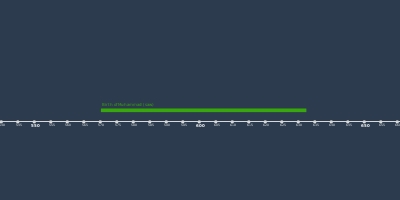Birth of Muhammad ﷺ (apr 22, 570 – jun 8, 632)
Description:
Born in Saudi Arabia to Abdullah ibn Abdul-Muttalib, Muhammad initially adopted the occupation of a shepherd, and later became a merchant. In his youth, he was called by the nickname "Al-Amin", a common Arab name meaning "faithful, trustworthy" and was sought out as an impartial arbitrator. During the month of Ramadan, Muhammad would retreat to a cave located at the summit of Mount Hira, just outside Mecca in the Arabian Hijaz, where he fasted and prayed. According to Islamic belief, when Muhammad was about forty (610 CE), Archangel Gabriel visited him in the cave and commanded him to recite verses sent by God. These revelations continued until his death twenty-three years later. The collection of these verses is known as the Qur'an.He expanded his mission as a prophet, publicly preaching strict monotheism, preaching against the social evils of his day, and warning of a Day of Judgment when all humans shall be held responsible for their deeds.
After ignoring Muhammad's preaching, the elites in Mecca, commercially threatened by the growing popularity of his message, persecuted Muhammad and his followers. This continued, and intensified, over more than a decade. The hardships reached a new level for Muhammad after the deaths of his wife Khadija and his uncle Abu Talib, an important political protector of Muhammad. Eventually, in 622, he left Mecca in a journey known to Muslims as the Hijra (the Migration).[4] He settled in the area of Yathrib (now known as Medina) with his followers, where he was the leader of the first Muslim community.
Eight years of war between Muhammad and Meccan forces followed, ending with the Muslim victory and conquest of Mecca. The Muslims subsequently removed everything they considered idolatrous from the Kaaba. Most of the townspeople accepted Islam. In March 632, Muhammad led the pilgrimage known as the Hajj. On returning to Medina he fell ill and died after a few days, on June 8.
Under the caliphs who assumed authority after his death, the Islamic empire expanded into Palestine, Syria, Mesopotamia, Persia, Egypt, North Africa, southern Spain, and Anatolia. Later conquests, commercial contact between Muslims and non-Muslims, and missionary activity spread Islam over much of the Eastern Hemisphere, including China and Southeast Asia.
Added to timeline:
Date:
apr 22, 570
jun 8, 632
~ 62 years
